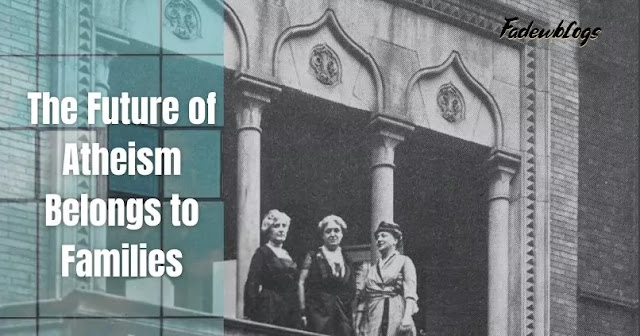Atheism's Future Is Dependent On Families?
Despite being a lifelong atheist, I came to the secular community as a new parent, looking for like-minded friends for my child and myself.
It’s a common journey: once a casual atheist, you become a new parent and find yourself bombarded with a host of new and frustrating ways American Christianity forces itself into your life.
You face christenings, godparents, religious hospital rules, navigating church-based childcare, and the absolute worst—pushy religious relatives.
Sometimes you find your way into one of the many online groups for atheist parents, or maybe you’re lucky enough to connect with a local in-person atheist or humanist gathering.
Remarkably, I found a secular mom group called Little Heathens of Champions/Spring. They met once a week for a playdate before the storytime at the library, with an occasional parents’ night.
Since I was stuck at home with a new baby and no family nearby to lean on, those Tuesday playdates became my lifeline.
When the group’s original organizer moved out of state, I happily stepped up as a new co-organizer. Our group picnics grew bigger, and together we hosted barbecues and parties in our homes, collected food for the local food bank, celebrated the births of more secular babies, and mourned the loss of a dear friend and fellow parent.
From that experience, my passion for building secular family communities grew. Along with my journey from that first mom group to Assistant State Director for Virginia at American Atheists, I’ve met a lot of atheists— most of them parents.
One of them once told me she didn’t realize how much she needed our community, Little Heathens until we gave it to her.
As the saying goes, “It takes a village to raise a child.” It’s a worn-out trope, but so many families I’ve encountered are yearning for that village—for our families to be part of a like-minded community of support.
The U.S. Secular Survey illustrates how atheists in the U.S. struggle with various discriminations and challenges.
These challenges are compounded for families, as they face adverse circumstances with the additional burden of children.
Estrangement from religious relatives can become exponentially more complicated when you add kids into the equation.
You may suddenly find yourself navigating religious bullying and discrimination against your children, perpetrated by everyone from their teachers, to classmates and other children, to their own grandparents.
And just wait until you find out that the only truly affordable childcare is through your local Baptist church! For most of us, especially those of us who come from casual Christian or secular backgrounds, life before kids meant the privilege of turning a blind eye to everyday acts of religious intrusion.
Secular families need and deserve spaces where conversation and activities put families first, and where the primary mission is the betterment of the community through supporting families.
Groups like Oasis and Sunday Assembly use church-like models to create family-friendly community spaces to bring atheists together. But they aren’t for everyone, especially those who are deterred by the church-like aspect or who never went to church.
What worked and felt right in my experience are intentional-yet-organic social networks that create the type of community a church creates outside its four walls. Another place atheists have found each other is among the homeschooling community, where kids find support from like-minded peers.
It’s not uncommon for families to pull their trans and gender-nonconforming children from public school to homeschool them.
These families are finding each other through secular homeschool groups online, and they’re creating supportive and inclusive social environments for their kids who, as LGBTQ atheists, often face an intensification of oppressions in their local community or school environment.
Parents and families want to be included, but there is a world of difference between a so-called “family-friendly” atheist group and a truly family-inclusive secular community.
Many atheist groups operate under the assumption that members don’t “atheist” and parent at the same time.
Drinking skeptically? Not without a babysitter! Atheist speaker? Not unless there’s a kid-friendly distraction! Volunteer event?
Can’t bring my kid to pick up trash on the side of a busy road!
As parents—and specifically the largest nonreligious group of parents in U.S. history—we’re uniquely positioned to change the world.
How we raise our children, the resources we provide for them, and the example we set for them with our actions and activism will shape the future of our country. We are raising them to know the value of secular society and human connection through community.
Families can’t do this alone; we need help from the 70% of atheists who don’t have kids. That help comes in the form of policy changes, educational reforms, and the ongoing efforts to keep religion out of our public schools.
Secular families need to know that, as a community and as a culture, childless atheists have our backs.
As atheists, secular parents share values based on acceptance, equality, and equity, caring for the environment, protecting human rights, and emphasizing inclusivity.
We want our children to grow up within a community that shares and exemplifies these values.
The U.S. Secular Survey is good news for families; it means we are finally making ourselves visible through our engagement.
It means we are finding room for diversity of leadership and membership within the atheist community.
It means we see the room to grow and the desire to do so.
And guess what? It turns out, you don’t have to have kids to be part of the atheist family.
━━━━━━━━━━━━━━━━━━━━━━━━━━━━━━━━━━━━━━━━━━━━━━━━━━━
By Dusty Sabourin, AmericanAtheists’ Assistant State Director for North Chesterfield, Virginia, founder of Little Heathens of RVA, and a board member of Washington Area Secular Humanists.
Read more:


